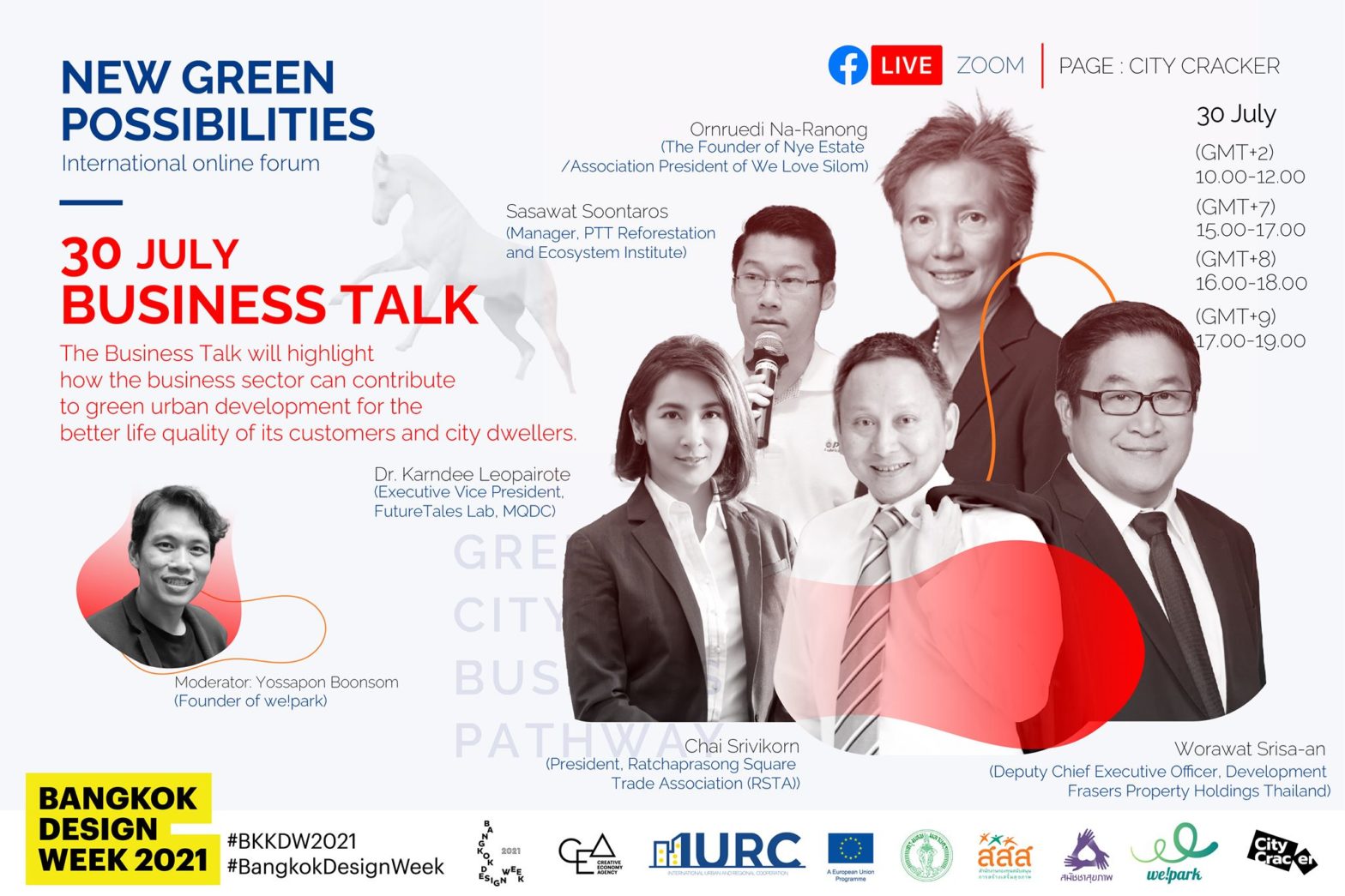The Business Talk of the “New Green Possibilities” International Forum, organised on 30 July, marked a rare occasion where Thai corporations, particularly those in property development, came together to discuss their contributions to the promotion of green urban space and smart city solutions and offer suggestions for better regulations that could lead to better urban development. The Business Talk was the 4th session of the “New Green Possibilities” series, which dealt with urban policy, platforms for citizens engagement, and urban design.
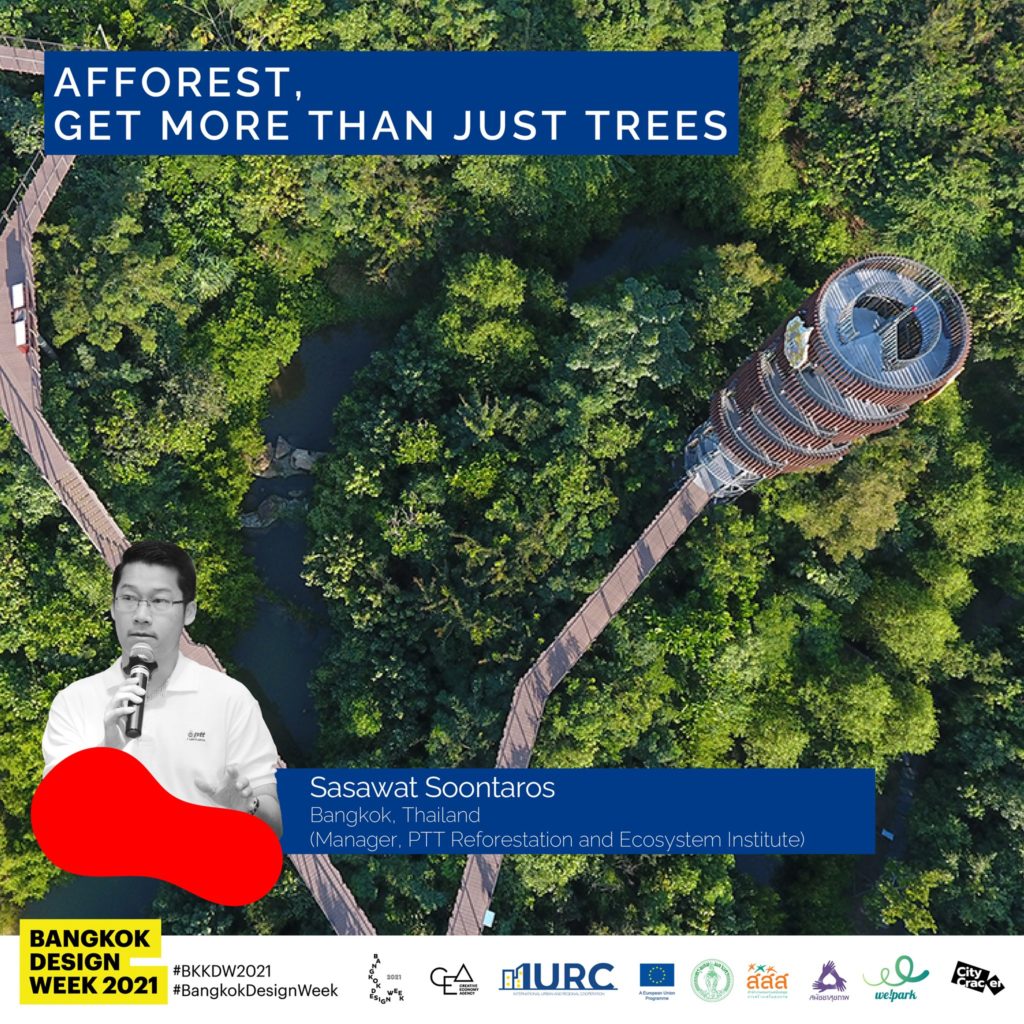
The talk began with the presentation by Sasawat Soontaros, Manager of the PTT Reforestation and Ecosystem Institute. Formerly the Petroleum Authority of Thailand, PTT is the country’s national energy company. It has been involved in reforestation in Thailand since 1994 when it launched the “1 Million Rai” Reforestation Project, which aimed to restore forests on 1 million rai, or 160,000 hectares, of land. In 2013, the company set up the PTT Reforestation and Ecosystem Institute to further promote environmental conservation, which then established two forest learning centres in 2015. As of 2020, PTT has reforested an accumulated area of 1.16 million rai, or about 186,000 hectares, which could absorb 36.49 MTCO2.
One of the forest learning centres is the Metroforest, located on the outskirts of Bangkok close to the Suvarnabhumi International Airport. The project transformed a 1.92-hectare dumpsite into a man-made forest that consists of a nature trail, a “skywalk” to stroll through the greenery and an observation tower. It also has an exhibition building that gives visitors information on Bangkok’s ecosystem. The Metroforest conducts many activities, including educational programmes, research and community engagement. It is important for the learning centre to create a sense of belonging for the people in the neighbourhood.
In addition, the Institute has launched a one-stop tree-planting serviced called “Forest for Chance”, which will create tailor-made forests on any type of land as nature-based solutions for land or property owners.
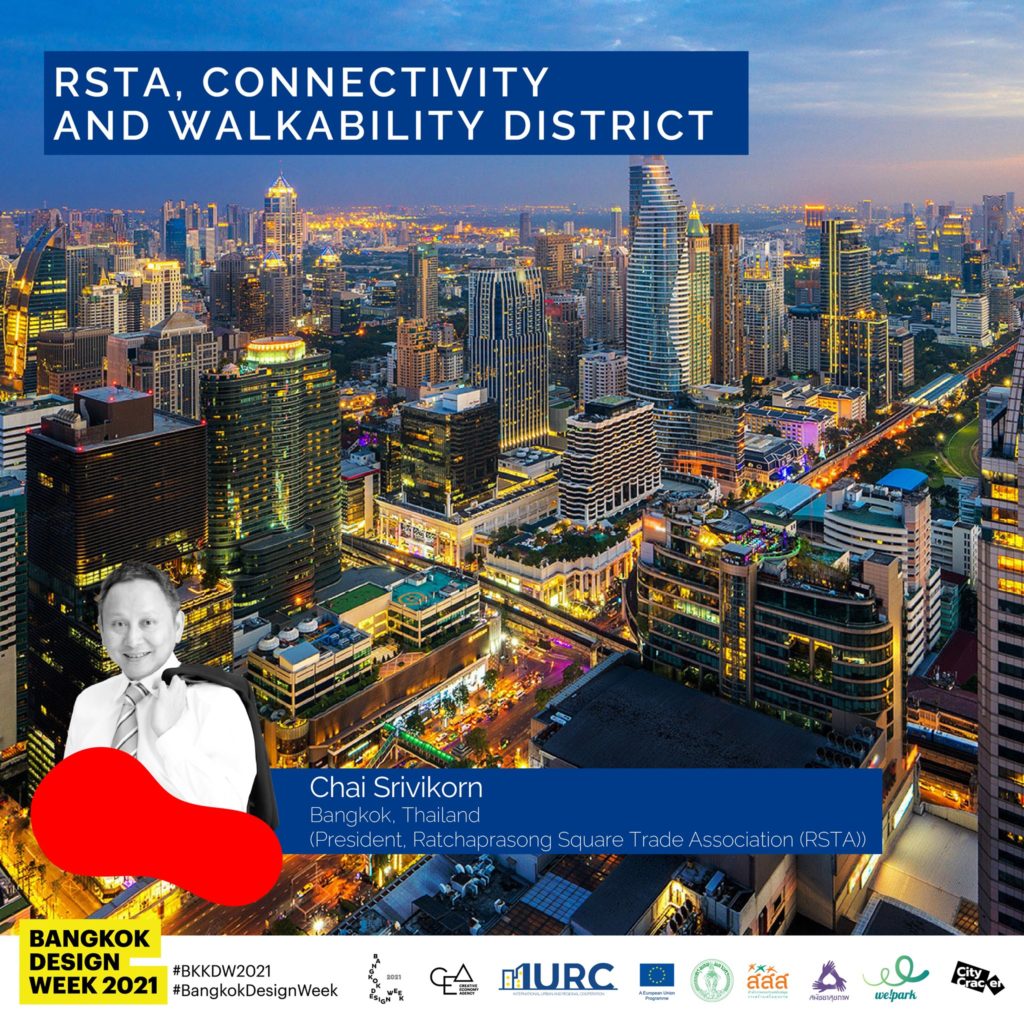
The second speaker was Chai Srivikorn, President of the Ratchaprasong Square Trade Association (RSTA), whose presentation focused on connectivity and walkability of the “Ratchaprasong District” in the heart of Bangkok, where there are many shopping centres, hotels and office buildings, plus a park and a pier. Around 35,000 people live or work in this area. The RSTA has constructed the R Walk that connects the Siam and Chit Lom BTS Stations, improving connectivity, walkability and security in the area. The current phase of development is to make the Ratchaprasong District greener and smarter. The footpaths are being widened to have more trees while smart city solutions to parking, traffic lights and vehicle tracking and monitoring, waste management, pollution monitoring, etc. will be installed.
Chai said the RSTA has achieved a level of project sustainability as it has developed a community that takes leadership together, looking at the issues the members are facing and taking actions together. Sharing of information and experience is one part of the cooperation. As the world changes rapidly, he noted that building competence was crucial for the RSTA.
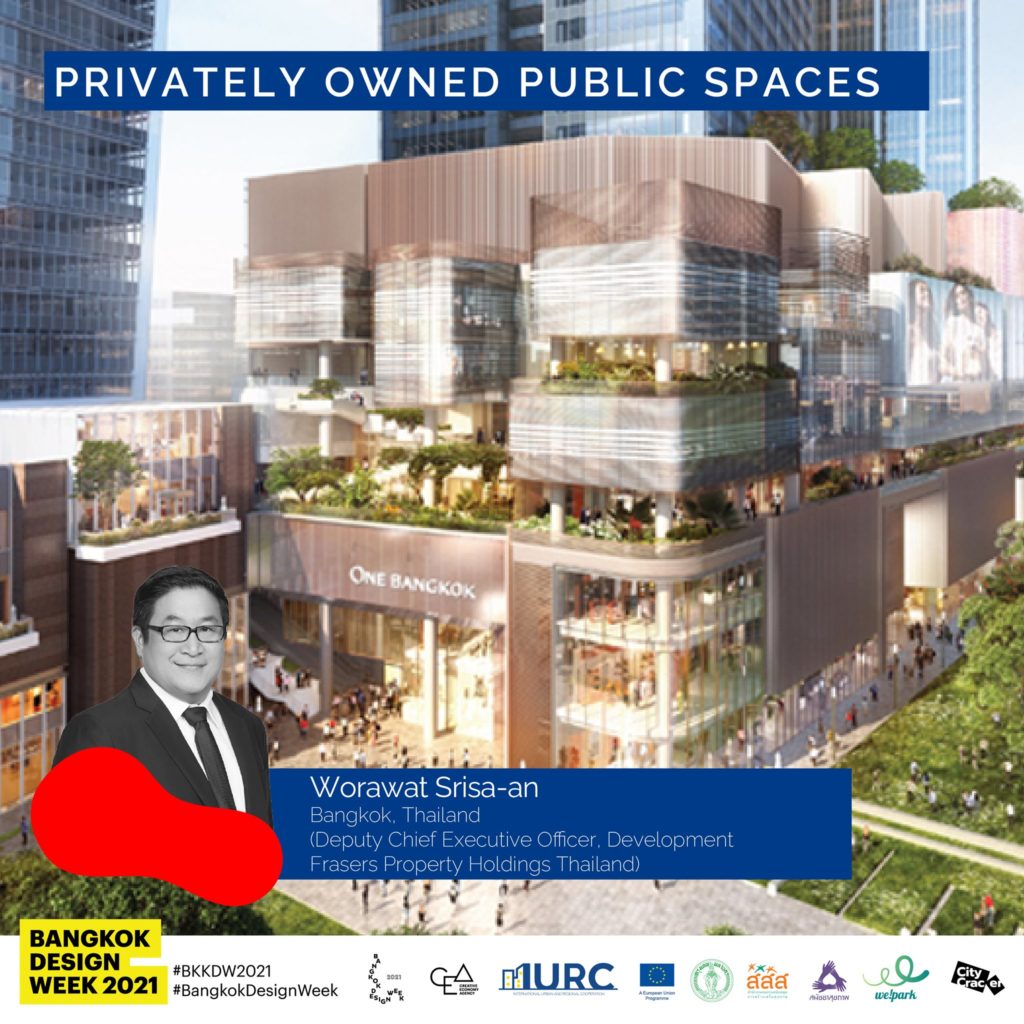
Next, Worawat Srisa-an, Vice Chairman of Frasers Property Thailand, started off his presentation by asking why developers must think sustainably. This is because the minimum lifespan of a project, or a leasehold to be specific, is 30 years, so developers need to ensure that a project creates some positive change to the city and retain value for the future. Regarding urban development in Bangkok, the speaker noted two key issues: lack of green space and limited rights-of-way coverage, the latter of which limits the city’s daily flow, restricts walkability and increases vehicle use. Therefore, Frasers focuses on increasing open and green space and rights-of-way coverage in the way it develops projects as these help promote environmental and health equity, social cohesion as well as economic development. He showcased five Frasers properties in Bangkok that contribute to improving the two issues mentioned.
In addition, he also suggested the BMA to reexamine parking requirements so that more space can be dedicated to green areas. Worawat addressed this point by citing the Hudson Yards in New York and the Roppongi Hills in Tokyo as examples. The Hudson Yards has an area of 1.6 million sq.m. and a parking space for 1,300 cars and the Roppongi Hills has an area of 785,000 sq.m. and a parking space for 2,760 cars. If they were to apply BMA regulations, the Hudson Yards and the Roppongi Hills needed to have a parking space for 14,070 cars and 6,540 cars respectively.
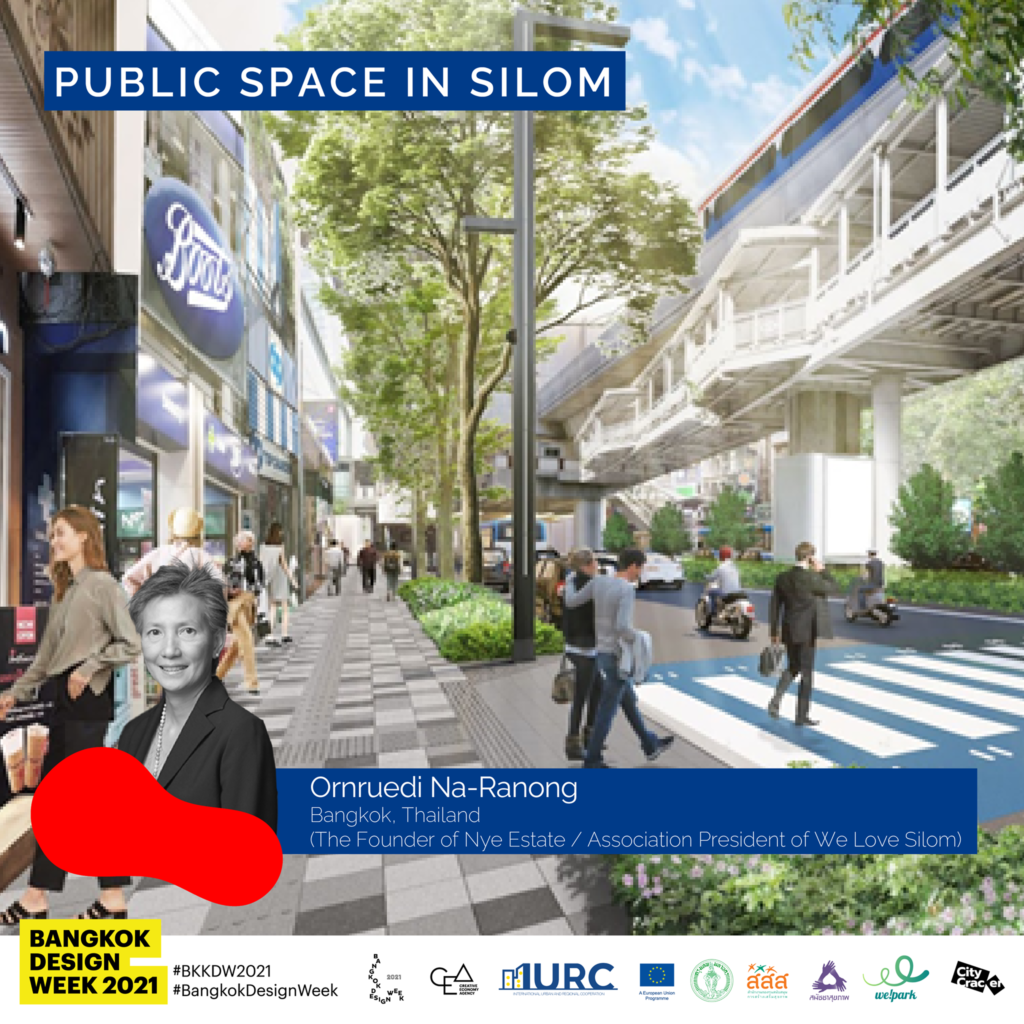
Another district-based collective invited to join the discussion was the We Love Silom group, which is in the process of registration as an association. The group was represented by Ornruedi Na-Ranong, the founder of Nye Estate, who said her group, formed in 2018, took the inspiration from the RSTA. Silom is a financial district in Bangkok, which before the pandemic accommodated around 56,000 office workers during the day and 10,000 visitors at night. The issues the district has faced over the years include traffic, air pollution, poor lighting, street vendors obstructing the footpath and poor hygiene.
At present, the group wants to improve Silom’s connectivity, environmental surroundings, safety and hygiene, and the walkability of its streets. It encourages new buildings to have a setback of 40 metres, a great jump from the 6-8-metre setback of old buildings. In addition, it is participating in the Green Bangkok 2030 initiative of the BMA to increase green public space in Silom. Ornruedi noted several challenges to Silom’s development plan. These include the pandemic that has severely affected many businesses in the area, the fact that Silom’s stakeholders are very diverse, requiring a great deal of communication and cooperation, and the BMA’s commitment and budget.
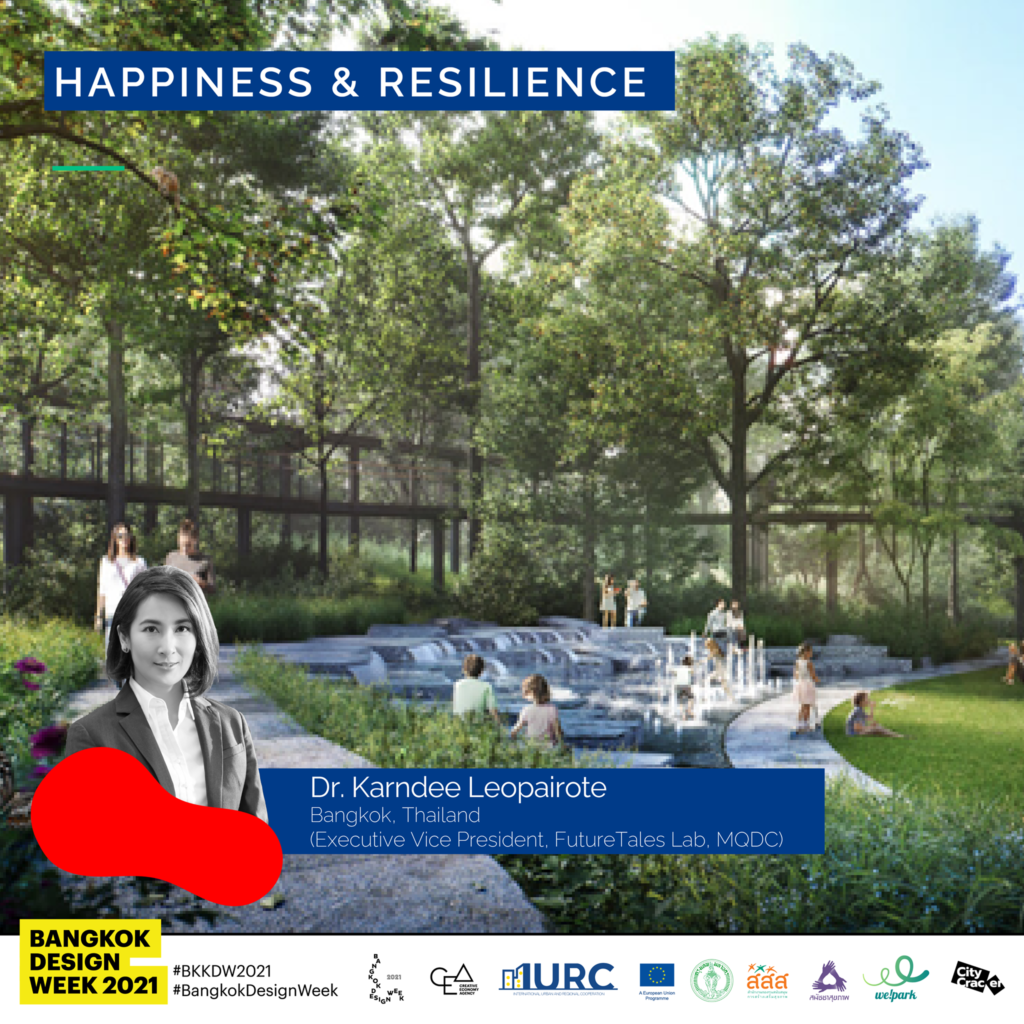
The last speaker was Karndee Leopairote, Executive Vice President of FutureTales Lab, which is a research centre for future solutions of Magnolia Quality Development Corporation Limited (MQDC). As a developer, MQDC has a mission to reduce its ecological footprint and restore green space to the city. Its flagship project in this mission is The Forestias, a residential property with a man-made forest that is open to the public. The project used sustainable and innovative solutions in its construction and studied how the forest should be planted based on a lot of research.
The Forestias has some very interesting approaches and goals. For one, it wants the temperature within the project to be 2-3 degrees lower than the outside temperature. The trees planted at the site were those rescued from where they were no longer wanted in order to avoid transplanting, which would lead to a crisis in maintaining tree stocks overall. Most interestingly, the project uses different species of animals as KPIs to measure the richness of the forest’s biodiversity.
Did you join our forum? We’d love to hear your thoughts on our event. Email us at info-aa@iurc.eu.
To watch the talk: https://fb.watch/77J4iOA4lo/.
